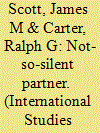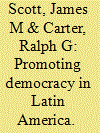|
|
|
Sort Order |
|
|
|
Items / Page
|
|
|
|
|
|
|
| Srl | Item |
| 1 |
ID:
132373


|
|
|
|
|
| Publication |
2014.
|
| Summary/Abstract |
The conventional narrative surrounding the post-9/11 "War on Terror" tends to characterize the US Congress as a mostly inactive and compliant bystander, bowing to an aggressive assertion of unilateral presidential authority and power by the Bush administration. However, clarifying the conceptual framework used to examine legislative-executive interactions and congressional foreign policy behavior to account for varying patterns of interaction and varying avenues of influence yields an alternative explanation. While there is some truth to the conventional wisdom about a Congress rallying to support the president in time of war, applying the refined conceptual framework brings a more complex story into sharper focus. Viewed through this alternative lens, we see that members of Congress, and the institution as a whole, played a more discriminating and substantial-yet still predictable-role consistent with the context of the situation and the broad historical forces and patterns that combine to shape congressional foreign policy behavior and influence. Once the context and forces shaping congressional behavior and legislative-executive interactions are understood, congressional engagement (or lack thereof) in the War on Terror from 2001 to 2009 emerges as a relatively predictable sequence of initial compliance, (rallying) giving way first to competition and then to confrontation.
|
|
|
|
|
|
|
|
|
|
|
|
|
|
|
|
| 2 |
ID:
143579


|
|
|
|
|
| Summary/Abstract |
Since the Cold War the USA has articulated and implemented explicit strategies of democracy promotion. One interesting target of such efforts is Latin America, in part because of the region’s geographic proximity to the USA and of the mixed record of US support for democracy there. This paper examines the impact of the end of the Cold War and the 9/11 episode on the nature, purposes, targets and consequences of US democracy assistance to Latin America. Examining democracy aid allocations, social and political factors and other variables, it traces changes in aid strategies, purposes and recipients generated by these paradigm shifts, and assesses the impact of such assistance on the politics of the region. It concludes with implications of these findings for US democracy promotion policies.
|
|
|
|
|
|
|
|
|
|
|
|
|
|
|
|
| 3 |
ID:
052966


|
|
|
|
|
| Publication |
Aug 2004.
|
| Summary/Abstract |
"Congressional foreign policy enterpreneurs" are those legislators who initiate their own foreign policy agendas. These individuals seek to frame policy discussions and mobilize public and intrest group intrest; to direct congressional agendas toward specific foreign policy issues; to struture and influence the formulation of foreign policies by the executive branch; to revise, refocus, or reformulate foreign policies; to generate alternative and replacement foreign policies; and to fill policy vaccums with their foreign policies. This paper examines the evolution and impact of such entrepreneursacross the period of the Cold War consensus (1946-1967), the Cold War dissensus (1968-1989), and the Post-Cold War(1990-2000). The paper first provides an overview of the concept of foreign policy entrepreneurs. It then turns to case studies of entrepreneurial initiatives from three prolific entrepreneurs whose careers span the post-World War II era : Senators Jacob Javits, Edward Kennedy, and Christopher Dodd. Together, the overview and cases shed light on the different avenues and activities that entrepreneurs use to adress their preferred issues and the impact entrepreneurs have on policy, as well as highlight changes in both over time.
|
|
|
|
|
|
|
|
|
|
|
|
|
|
|
|
|
|
|
|
|